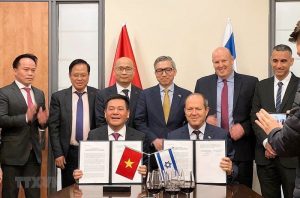Earlier this week, Vietnam announced that it will sign a free trade agreement with Israel after seven years of negotiations, an event that is timed to the 30th anniversary of relations between the two countries. According to a report by Reuters, which cited a Vietnamese government statement, the two nations will officially conclude the economic agreement later this year.
Bilateral trade between Israel and Vietnam rose 18 percent last year to $2.2 billion, the government said in the statement. It added that Vietnam’s largest exports to Israel include smartphones, footwear, and seafood. Its main imports from Israel are electronics and fertilizer.
Once the agreement is signed, Israel will become the 16th nation or grouping with which Vietnam has established a free trade pact, which includes bilateral agreements with Japan (2009), Chile (2014), South Korea (2015), and the United Kingdom (2021). Since the early 1990s, the country has also signed on to a number of multilateral trade pacts, including the Regional Comprehensive Economic Partnership, the world’s largest free trade area, as well as free trade pacts with the European Union and the Association of Southeast Asian Nations (ASEAN). Together, these have stitched Vietnam tightly into the supply chains of the global economy, and helped produce a burgeoning manufacturing sector that has driven the country’s rapid economic growth.
It is also in the midst of negotiating a free trade pact with the European Free Trade Association, a grouping that includes Iceland, Liechtenstein, Norway, and Switzerland
Since establishing relations at the end of the Cold War, Vietnam and Israel have gradually established what is now a fruitful economic relationship. In a 2018 interview, Nadav Eshcar, then Israel’s Ambassador to Vietnam, said that while the overall level of trade between them was modest, their economies were highly complementary.
“Vietnam is a large-scale exporter of food and agricultural products primarily focused on fish, meat, rice, fruit, and spices, and Israel is a natural partner, providing technologies that will improve both the quality and quantity of Vietnamese goods,” he said.
The agreement with Israel is notable less for the concrete economic benefits that it will deliver Vietnam – neither country is in the other’s top 20 biggest import or export partners – than as a reflection of the benefits of the Vietnamese government’s omnidirectional foreign policy. Given the country’s crushing proximity to and heavy economic reliance on China, it has worked tirelessly to establish good economic relations with as many nations as possible, however insignificant they might seem.

































